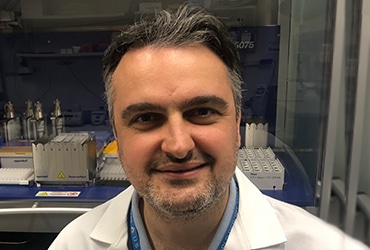A Neurosurgeon Speaks on the Impact of an AACR-Conquer Cancer Foundation of ASCO Young Investigator Award
The AACR-Conquer Cancer Foundation (CCF) of ASCO Young Investigator Award for Translational Cancer Research provides funding to promising investigators to encourage and promote quality research in clinical oncology. The purpose of this jointly-supported award is to fund a physician-scientist during the transition from a fellowship program to a faculty appointment.
Dimitrios Mathios, MD, received the AACR-CCF of ASCO Young Investigator Award in 2020. He proposed a new approach that combines genetic and epigenetic features of circulating tumor DNA with machine learning to distinguish patients with brain tumors from disease-free individuals.

What do you believe have been the most significant/impactful research findings that you have made, with the support, at least in part, from your AACR-CCF of ASCO award?
While significant progress has been made in non-invasive diagnosis of non-central nervous system tumors via liquid biopsy approaches, none have proven successful in detecting brain tumors via a blood draw. At the time I submitted my proposal, there was no technology that had shown promising results in the field. My preliminary data at the time, and now the larger scale data, support the idea that analysis of whole genome sequencing of cfDNA fragments derived from plasma of patients with brain tumors could distinguish patients with or without brain tumors and provide evidence of how aggressive the tumor they carry is.
What have been the benefits of receiving the AACR-CCF of ASCO award to your career as a physician and as a physician-scientist?
Receiving the AACR-CCF of ASCO award has benefited me significantly in many ways. First of all, it provided the resources to perform the research I was planning on pursuing. The Scientific Review Committee provided useful feedback to my proposal that has helped me understand what I did right and how I can improve further on writing proposals for future competitive grants. As a neurosurgery resident, receiving a competitive award demonstrates your ability to successfully do high level research and perform surgeries at the same time, a requirement for those interested in pursuing a surgeon-scientist career. As I am applying for academic positions in Neurosurgery, I find that having received the AACR-CCF of ASCO award is widely recognized as a significant accomplishment by my future employers. Finally, receiving this award sets the basis for applying for additional funding that will hopefully help me move my ideas closer to clinical implementation, which is my main goal.
What message would you like to convey, if any, to other physician-scientists who may be considering applying for the AACR-CCF of ASCO award, or grants of a similar nature?
The AACR-CCF of ASCO grant is an excellent award for a physician-scientist to have received. It provides the basis of your research as a young investigator, establishes you as someone who can successfully apply for competitive grants, and allows you to connect with your peers and potential future funders.
Since 1993, the AACR grants program has contributed to the development of new and improved approaches to cancer treatment and cure. What is your vision for the future of brain cancer research?
Neurosurgery, and specifically neuro-oncology, has come a long way from the early 20th century when mortality after any brain tumor surgery was the rule, rather than the exception. More than 100 years later, brain cancer patient outcomes have significantly improved. However, there is still so much we do not know about this disease. There is much room for improvement in diagnosis as well as in surgical and oncological treatment.
To significantly accelerate the use of non-invasive testing in brain cancer detection and monitoring, I propose pursuit of the following:
- rigorous assessment of proposed non-invasive tests in patients with brain tumors and brain tumor mimetics (such as multiple sclerosis, neurovascular inflammatory syndromes, stroke).
- development of non-invasive tests that can differentiate the location/histology of the tumor in the human body. PET scans are inadequate for brain tumor detection, given that most primary brain tumors are undetectable by this technology.
- correlation of non-invasive testing with MRI imaging, histological findings, and clinical outcomes in each patient. These efforts are critical to determine how non-invasive tests fit in the existing diagnostic algorithm.
- studies on the variation of non-invasive test results during radiotherapy or chemotherapy.